How to stop being insecure? Many of us are seeking the answer to this question. Struggles around self-doubt and anxiety in the face of public scrutiny are familiar to most people. These issues are especially prevalent during times of significant changes.
For example, when a first-year student joins a new class, moves to a different city, or encounters unfamiliar responsibilities. Not everything will be perfect at first. However, that doesn’t mean you should blame yourself and diminish your achievements.
This article, prepared by IvyPanda’s team, aims to remind you of these facts and help you get rid of insecurities. It explains the roots of one’s self-doubt and contains pieces of advice for an insecure person.
👀 Find the Roots of Your Insecurities
Insecurity and self-doubt begin to manifest in our lives from an early age. They appear in childhood as a lack of confidence in our actions or uncertainty about our accomplishments. To get rid of them, you should figure out their source.
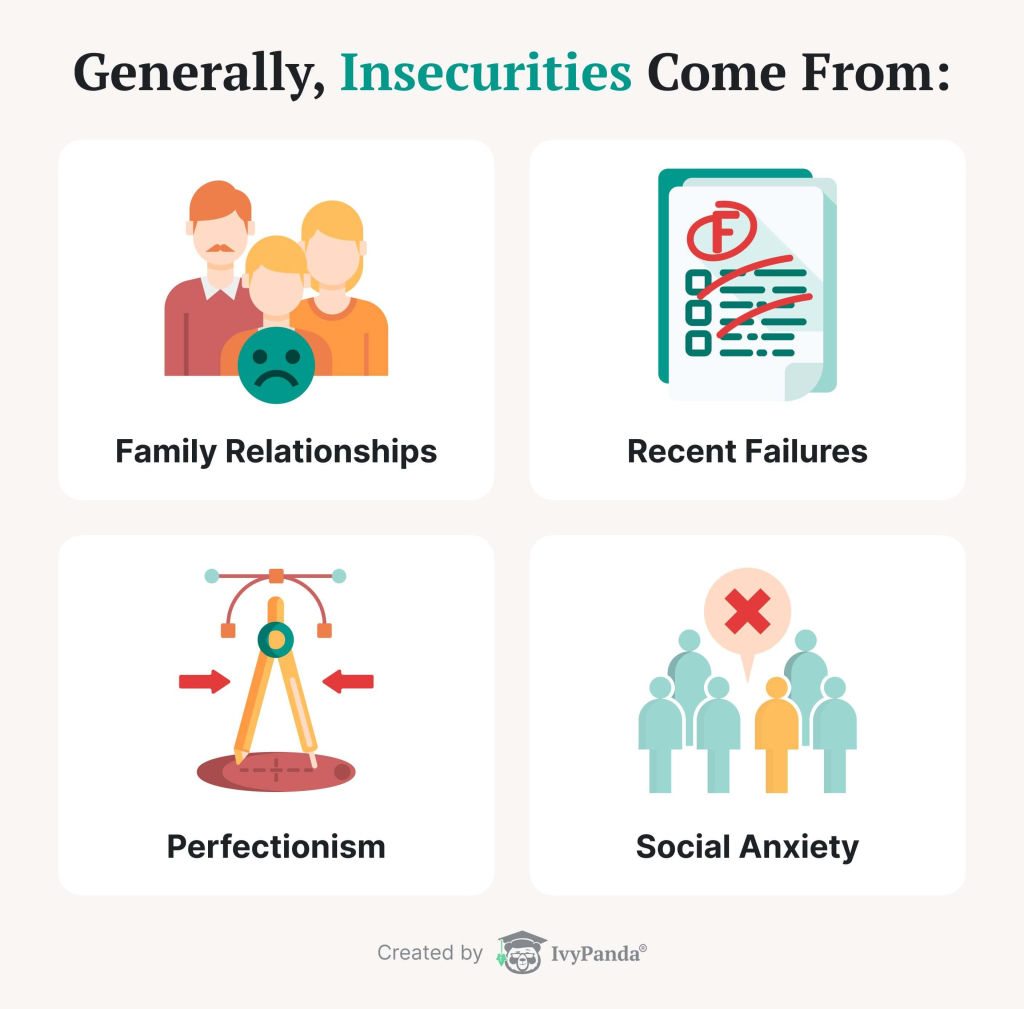
Why Am I Insecure?
There are four usual answers to this question: your relationship with your parents, social anxiety, recent failures, or perfectionism. You can see them thoroughly explored in our essay database or in the related articles online.
Let’s examine each of them in short:
- Estranged relationships with your parents.
The bond between an individual and their parents greatly impacts their sense of personal security. It begins to form in early childhood and serves as the foundation for constructing subsequent relationships in that person’s life. An individual can develop an insecure attachment style due to trauma or neglect. This leaves them with emotional anxieties that can hinder their sense of self-confidence. - Social anxiety.
Like most emotional issues, social anxiety often stems from childhood (though it can also develop later in life). It can arise as a result of exclusion from friend groups, parental pressure, bullying, discrimination, or other traumatic events. Social anxiety distorts a person’s perception of their self-worth. It makes them believe that others are constantly judging their actions. The fear of being evaluated and considered not good enough leads these individuals to feel self-conscious. - Recent failures.
Everyone goes through challenging periods, occasionally falling short of accomplishing something important. These failures are never pleasant, but they can hit some people harder than others. Individuals with lower self-esteem will usually be more sensitive to setbacks and defeats, which will only reinforce their anxieties. A recent failure, such as a bad grade, may remind them of their insecurities. It can trap them in a cycle of negative self-talk and self-doubt. - Perfectionism.
Ensuring that your work is of a high standard and paying attention to detail are admirable qualities. However, when taken too far, this can turn into perfectionism, which will always leave you feeling disappointed. After all, there is no way to ensure that everything you do will turn out flawless. If you keep blaming yourself for your inability to be perfect, your confidence and self-esteem will significantly suffer.
What Can I Do?
If you have succeeded in determining the source of your self-doubt, it will be much easier for you to manage it. Firstly, understanding the reason for your feelings allows you to assess your situation from a new angle. That could be enough for you to start believing in yourself. Secondly, every problem has its unique solution:
Case #1: You’re insecure due to estranged relationships with your parents.
Possible solution:
Practice being more honest and vulnerable with people. This will let your mind get used to opening up and connecting with others. Purposefully approach your friends or family members to spend quality time together. Talk through the things that concern you. You might find out that being open about your insecurities can help you overcome them.
Case #2: You’re insecure due to social anxiety.
Possible solution:
Focus on others instead of concentrating on yourself and your actions. Notice what the people around you are doing, saying, or feeling. Try to find similarities between them and yourself or a common point of interest. Don’t avoid social situations since that will only worsen your anxiety.
Case #3: You’re insecure due to recent failures.
Possible solution:
Take a step back and see that it is a natural part of life. A single failure – or even a string of failures – does not define who you are as a person. Also, don’t forget about your achievements. You can recover from the experience by reaching out to close ones or doing something you enjoy.
Case #4: You’re insecure due to perfectionism.
Possible solution:
Remind yourself that “perfection” isn’t obtainable. Besides, every person will have a different opinion on the same subject. It is also very likely that no one pays as much attention to the little details as you. The thing that matters most is the effort that you have invested in a project. Sometimes, “good enough” is an acceptable result.
🧠 Reframe Negative Thoughts
When something goes wrong, it is easy to get trapped in a cycle of pessimism and self-blame. However, if you keep putting yourself down, it will only further reinforce your feelings of guilt and insecurity. That’s why it is vital to learn how to reframe your thought pattern.
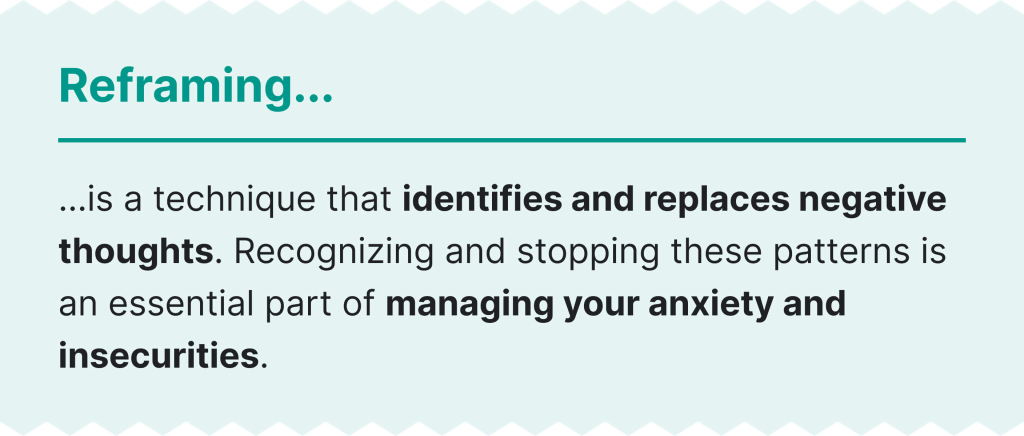
To start developing your reframing technique according to Cognitive Behavioral Therapy, you can follow these steps:
- Recognize negative thoughts. The first step to successfully managing your negative thought patterns is to become aware of them. Naturally, it is much easier said than done. This is why you have to be mindful of your thoughts and ideas. Strive to recognize those that could become harmful. Pay attention to how your thoughts make you feel and take a mental (or physical!) note.
- Ask yourself questions. When you recognize a negative idea in your mind, pause for a moment. What triggered the thought to appear? Is it helpful? Would you think the same thing if you were giving advice to a friend? Go through this list of questions to determine whether your thought process is constructive.
- Think of the real situation. Your emotional perceptions of reality typically warp your thoughts. Put your feelings aside for a period and step back to assess the facts. Are your thoughts reflective of the situation you are in? Consider only the statements that you know to be accurate at the moment.
- Try to find a different perspective. The end goal of these exercises is to discover an alternative to your harmful thinking patterns. Once you have noticed your negative thoughts and pinpointed the actual facts of the situation, deliberately redirect your mind. In other words, instead of focusing on everything that could go wrong, imagine a helpful and optimistic narrative.
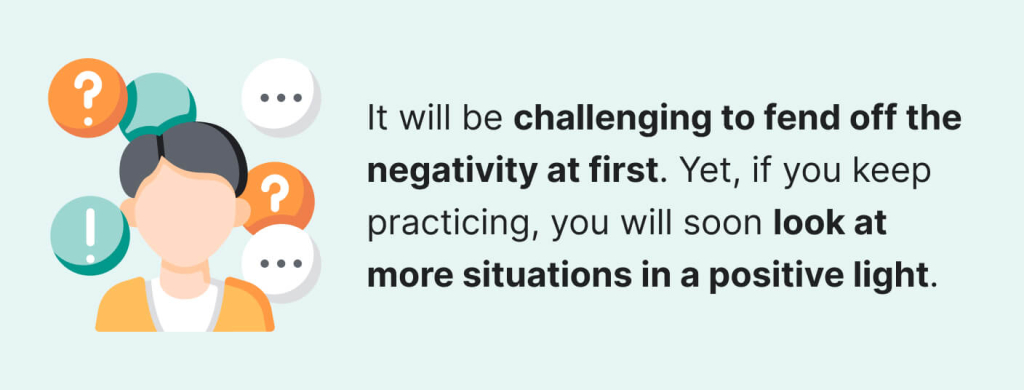
🥬 Take Care of Your Body
The human body is a complex mechanism. Our organisms may build connections between the most unexpected triggers and actions. For instance, when you are sad, you may just be hungry. When you are irritated, you may need to lie down in silence. When you find yourself insecure, perhaps you should take up self-care and improve your daily routine.
Here is how you can do it:
- Prioritize your sleep. Try to have 7 or 8 hours of quality sleep every day.
- Balance your diet. Your everyday meals should enrich your organism with proteins, healthy fats, and carbohydrates. Plus, eat enough vegetables and fruits.
- Take vitamins. You may lack specific vitamins in some seasons (usually in fall and winter). Deal with the deficiency by consulting with your doctor and deciding what vitamins to intake.
- Prepare healthy snacks. Instead of grabbing chips, buy nuts or yogurt.
- Avoid a sedentary lifestyle. If you’re required to sit most of the day, try to stand up and walk around at least every couple of hours.
- Take care of your body. Nurture it with a massage or other self-care procedures. And stay hydrated – your body needs water!
- Start working out. And try to reach consistency in exercising. For example, attend the gym every Monday and Thursday.
- Create a schedule and stick to it. This will help you to organize your tasks and complete them efficiently.
- Take walks whenever it is possible. For example, instead of getting home from university or working by bus, take a walk.
- Try power naps. If it is possible, combine a cup of coffee with a short nap to recharge your body.
- Support a healthy work-life balance. Make sure you are not overloaded with the tasks and have time to rest.
- Take showers. Do so in the morning, evening, or even in the middle of the day. Rinse your tiredness off and feed your skin with fragrant shower gel and lotion.
- Dedicate some time to doing nothing. Yes, it’s a precious gift you can do for yourself – just to lay in bed for half an hour.
💖 Train Self-Compassion
In the previous section, we discussed taking care of your body. Now, let’s explore how to take care of your mind.
If you want to become confident, you first should become compassionate. Not to people around you but to yourself, as your goal here is to become your best friend and biggest supporter. It will definitely help you gain self-worth and understand how to forgive yourself for your mistakes.
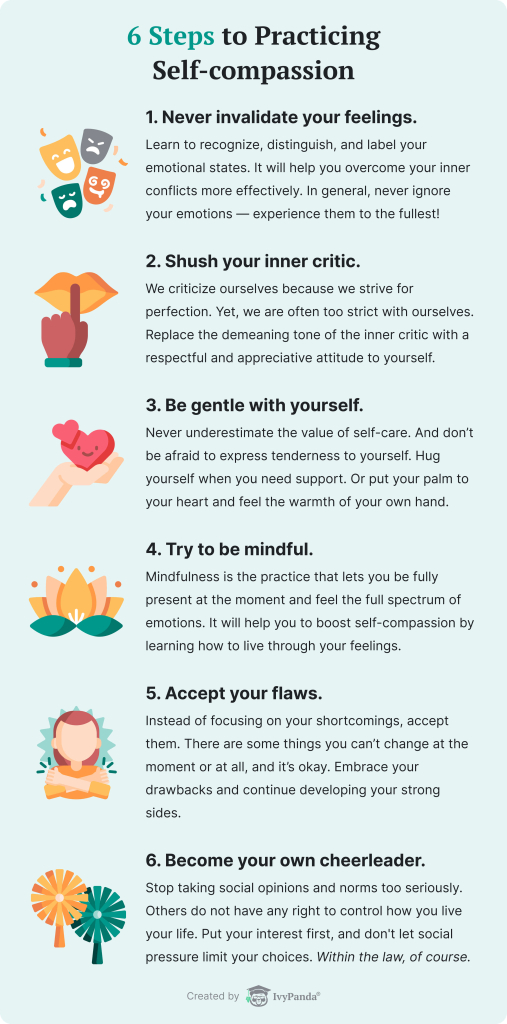
When we say “be your best friend,” we mean “treat yourself the way you would treat your best friend.” As soon as you berate yourself for what happened, ask yourself: what would you say if your best friend was in your shoes? Would you be so judgmental? Would you get mad at every little thing?
💡 Remember:
You should prioritize your own interests – that’s the only way you get enough care and attention.
✋ Filter out Toxic People
Noticed how your community has a tremendous influence on you? Ever felt incredibly insecure around particular people? This might happen when you are a part of a toxic group or hang out with manipulative people. Surrounded by individuals who always point out your imperfections, you lose your self-esteem bit by bit.
What’s the solution?
Get rid of toxic people – they should not be a part of your life. To figure out such individuals among your peers, try the following:
- Find out who causes drama. Toxic people are not interested in building healthy and trustworthy relationships. They always search for an opportunity to inflame emotions and start a conflict.
- Consider who doesn’t respect your boundaries. A toxic individual thrives on violating personal boundaries. So, if you’ve ever noticed that a person ignores your requests to stop behaving in a particular way, exclude them from your social circle.
- Think of the people you don’t trust. Building a trustworthy relationship with your loved ones is crucial to a happy life. Feeling uncomfortable sharing your thoughts with someone? Rethink your relationship with this person.
- Identify manipulative behavior. Feel like being used or taken advantage of? We have bad news for you: someone manipulates you. When you notice that a person constantly lies, exaggerates, or bends the truth, they are likely to be toxic.
- Determine who doesn’t take any responsibility. Toxic people are afraid of taking responsibility. Instead, they play victims. Pretending that the world is constantly against them, such individuals avoid responsibility for their actions at any cost.
If you find people in your social circle who check one or more boxes, consider whether you need to communicate with them. Most probably, the answer is no.
Toxic people prevent others from enjoying the moment by filling the entire space with their problems or manipulations. You may not have the opportunity to get rid of them completely. For example, you can’t simply ghost your colleagues, classmates, or family members. In that case, try to distance yourself from them as much as possible. And don’t even think about taking them seriously.
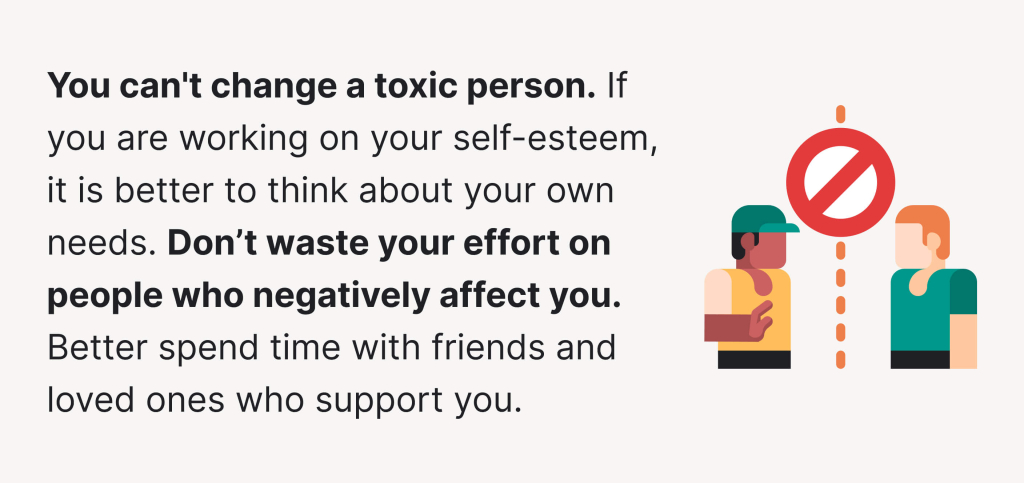
💃 Embrace the Cringe
The thing is: you don’t have to be perfect, no matter what your parents or yourself tell you. Not because we don’t believe in you but because achieving perfection is impossible. Try to realize that you’re allowed to make mistakes, fail, lose, and misbehave.
Let yourself be silly! And we can explain how you can do so:
- Let yourself make mistakes. People who don’t make mistakes are those who don’t try hard enough. It is part of the learning process, and you should try to enjoy every part of it. Failing but not giving up is a must to get where you want to be.
- Don’t put so much pressure on yourself. Lower unrealistic standards. You don’t have to make everything spot on from the first attempt, but rather try your hardest. It is alright not to be perfect. You are most likely your most demanding critic. So, learn to accept your limitations and be kind to yourself if you want to make your life easier.
- Keep in mind your insecurities. Your inner critic may tend to say that you are not good enough, especially when you’re not confident doing something. Keeping in mind your insecurities will help you fight unwelcomed thoughts. We all have issues and doubts. It is okay to embrace them as part of yourself.
- Look at the bigger picture. If you worry too much about minor things, it will slow you down. Doubting your actions can distract you from your goal and prevent you from enjoying the moment. Ask yourself whether your mistake or failure will still matter tomorrow or five years from now. If the answer is no, you have no reason to beat yourself up.
- Don’t compare yourself to other people. It is one of the most dangerous practices. The more we do it, the worse we feel about ourselves. The tendency is called social comparison, and it tends to make us dissatisfied. Even when we achieve great results and fulfill our dreams, seeing someone accomplish more is an unhealthy practice.
- Seek out the meaning. You can overcome striving to be perfect by wondering why. The answer will let you gain perspective and realize whether something is crucial or not. Instead of getting caught up in your failures, look at your life with a strong sense of purpose. Yes, you might not be perfect, but it’s alright!
- Allow yourself to try. Perfectionism is more about avoiding failure at all costs rather than reaching success. You might prevent yourself from growing just because you are anxious and scared. Considering the situation from the worst-case scenario is the hallmark of perfectionism. Instead, look at the positive side of trying something because it makes you closer to your goal.
💡 Mainly:
If you are embarrassed about some of your hobbies, don’t be. Everyone enjoys different things, so do not be ashamed about something you like. Your passions and interests are not “guilty pleasures” – there is no guilt in taking pleasure from something legal.
📚 Check a Self-Help Book
According to some studies, good self-help books can encourage you to solve your problems and get rid of self-doubt. You just have to find them among fruitless guides.
Searching for a high-quality self-help book can be a chore, so we’ve gathered a couple of tips that can assist you with it.
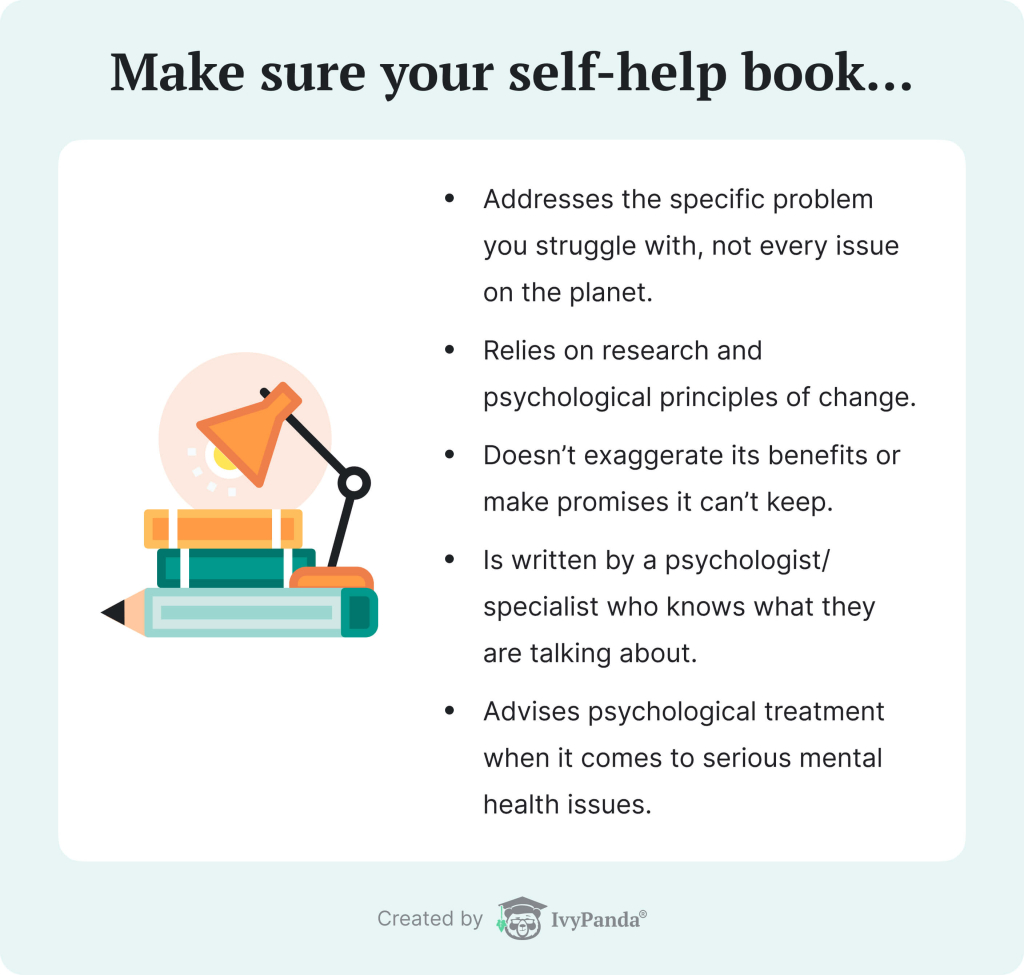
We recommend looking at the materials that we have preselected for you. It’s a great way to start the quest of finding your perfect self-help book to fight insecurities.
Self-Help Books We Recommend
- Everything Isn’t Terrible by Kathleen Smith
Dr. Kathleen Smith, a therapist and mental health professional, wrote a book for those who want to stay calm in the anxious world we all live in. The book will help you confront your destructive thoughts and take control of them. It consists of short chapters with stories from Smith’s practice. Plus, it provides exercises and tools to get calm. - Sabotage: How Insecurity Destroys Everything by Trinity Jordan
Trinity Jordan has been a minister for fourteen years of his life. He claims that our insecurities and lack of confidence alienate us from God. One of the commandments is to love God and others as we love ourselves. However, the key is to learn how to love ourselves.
Regardless of your religious beliefs, the book can help you gain self-confidence and a new perspective on life. It addresses issues of insecurities and assists in building good relationships. - Don’t Sweat the Small Stuff by Richard Carlson
In this book, the writer tells how to focus on the essential things in life. The small things should not keep you from living your life to the fullest.
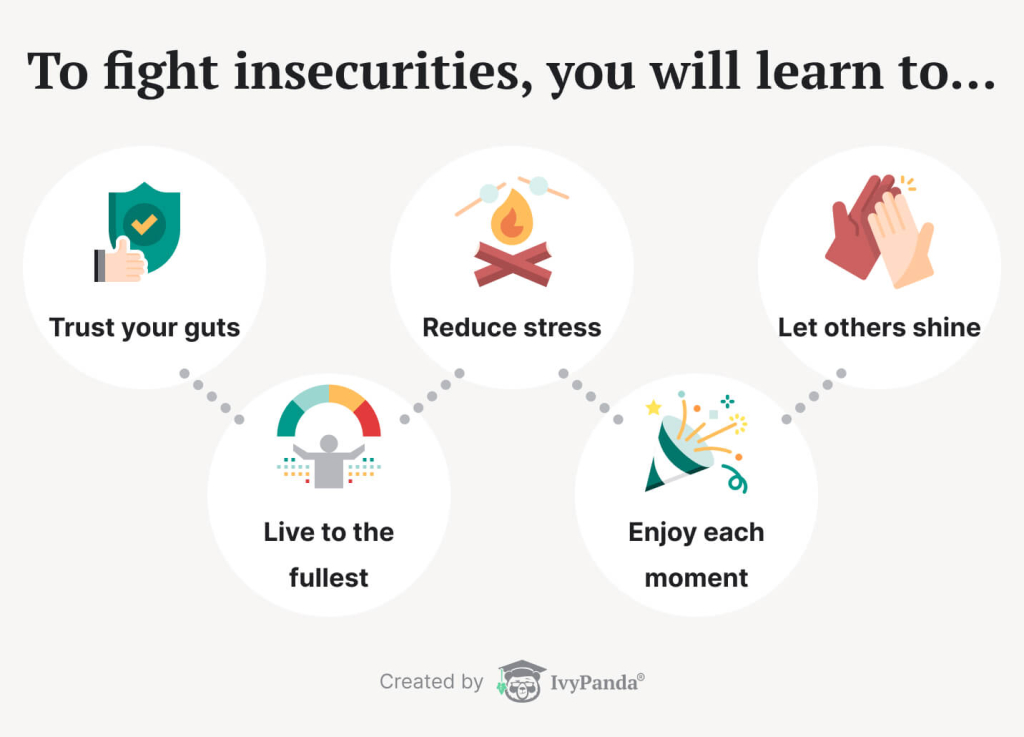
- They F*** You Up: How to Survive Family Life by Oliver James
Oliver James, a clinical psychologist, says that how we were cared for in the first six years of our life affects how we behave as adults. Love shapes our nature. And understanding our past can help us live our present-day freely. This book is for people who do not want to let a lack of confidence destroy their families. - Get Out of Your Head by Jennie Allen
The book is for people who want to control their negative thoughts. Some thinking patterns can be very toxic. Thus, true freedom is only possible when we refuse to be victims of our destructive minds. Get Out of Your Head helps us have a more positive outlook on our emotions and the circumstances around us. - The Gifts of Imperfection by Brené Brown
Brené Brown wrote a book that presents daily practices for living wholeheartedly. She explores definitions of what an “imperfect” life is and suggests embracing an authentic way of life instead. The author wants the readers to accept imperfections as something normal. - Almost Already: Insecurities, Failures and Other Fun Things Nobody Likes to Talk About by Jonathan Tony
The writer of the book states that everyone has insecurities. Despite this fact, in a world that seems perfect, people are embarrassed to admit to their self-doubts. Almost Already honestly addresses everyday issues. The author recalls the situations from his own life and even points out the Bible characters that struggled with insecurities. - Seven Habits of Highly Effective People by Stephen Covey
This is one of the most influential business books of the 20th century. These seven habits are famous on the Internet, even among people who know nothing about the market.
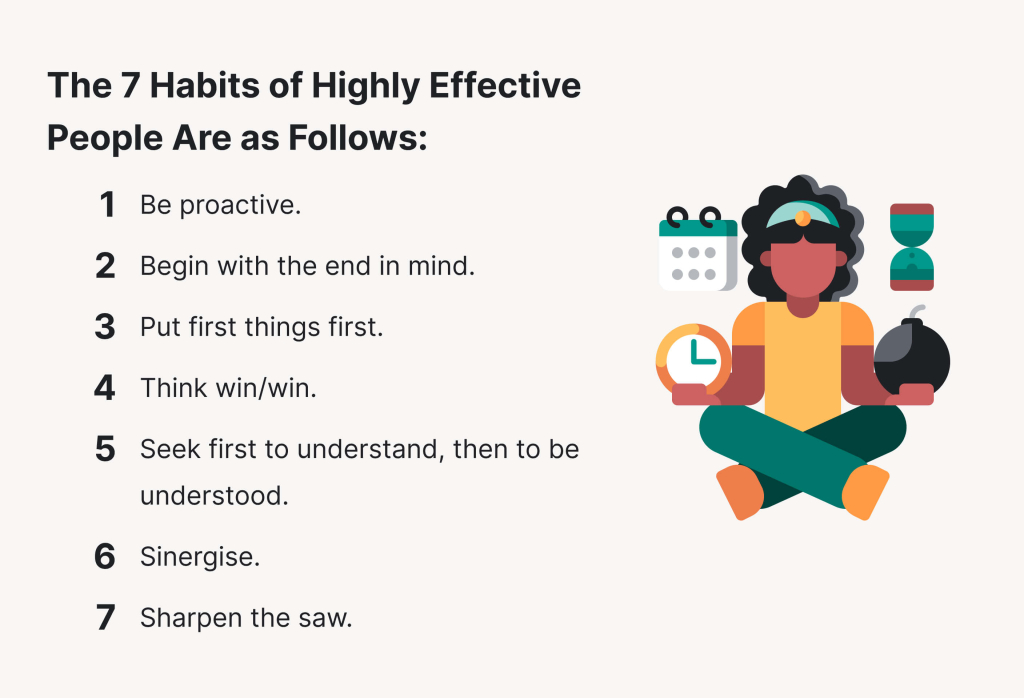
The writer explains the habits in detail and gives a step-by-step living plan with honesty, integrity, human dignity, and fairness.
- So Long, Insecurity: You’ve Been a Bad Friend to Us by Beth Moore
In the culture of sexism, women struggle to accept themselves because insecurities and fears rob them of joy. The book feels like a conversation with a close friend who is not afraid of stating the truth. The author invites women of all ages to be honest about their insecurities and stop comparing themselves with others. Instead, embrace our place in the world.
👩⚕️ Seek out a Therapist
In some cases, our advice might turn out to be completely ineffective. This is not that weird or unusual. Every person has to find their own unique way of dealing with insecurities. The thing that works for you might not turn up on this page. If none of the methods you have tried are effective, you might want to seek some additional help. In that case, we advise turning to a therapist.
It is a good idea to look for a specialist if:
- You feel hopeless. When your every waking moment is disrupted with thoughts of self-doubt, it can become difficult to look ahead. You might find that your feelings of uncertainty in yourself make you unable to visualize your future. In that case, it could be the time to seek some professional help.
- Anxiety burdens your life. We all get anxious, especially during periods of prolonged stress, such as exam season. However, thinking about your worries should not take up most of your day, let alone hinder you. Look into therapy, especially if you start showing physical symptoms.
- You avoid society. You might feel that the best way to manage your insecurities is to avoid situations that might become anxiety-inducing. In psychology, this is called “agoraphobia,” which is defined as the fear of being in environments you cannot control. When left untreated, this disorder can leave a person unable to leave their home.
- Your emotions are out of control. Insecurities can bring a whole array of different emotions that could quickly spiral out of your control. You may find yourself switching between bouts of anger or frustration, unable to regulate them. Therapy can help you explore and manage your reactions.
- You’re always tired. Constant anxiety and self-doubt will eventually start taking a physical toll on your body. It begins to manifest in small ways, such as trouble sleeping or lack of appetite. At some point, you will feel more noticeably tired, seemingly without any reason. That’s a sure sign that you should look into seeking professional help.
- Building and maintaining relationships is nearly impossible. You could find yourself withdrawing from your loved ones, spending more and more time alone. Alternatively, you could begin to lean far more heavily on the people around you, forming an unhealthy dependency. A specialist can help you work through these issues.
- Improving yourself seems like an unbearable challenge. Want to break out of the negative thinking pattern but can’t figure out how? Working on yourself is a worthwhile goal – but it is also a difficult challenge. Therapists can provide you with tools to accomplish this effectively.
In short, we encourage you to seek out a specialist at any moment you feel like you can’t handle an issue on your own. Even when that issue is a lack of confidence in yourself.
🔮 Bonus 21 Positive Affirmations to Get You Going
Positive thinking is a powerful tool when it comes to building your self-esteem. Yet, it can be quite tough to practice, especially for people with numerous insecurities. That’s why we recommend you try affirmations first.
When we believe in something wholeheartedly, it is more likely to come true. This may sound like fairytale magic, but it is entirely factual. Consciously focusing on a particular thought allows us to strengthen its presence in our minds. This is why positive affirmations effectively break the old negative thinking patterns. These are short sentences or phrases that you can repeat in your mind to build up new pathways in your brain for confident thoughts.
So as not to burden you with additional tasks and worries, we’ve already prepared a list of positive affirmations. Look through them and find the most relevant phrases that you will be able to repeat to yourself every day.
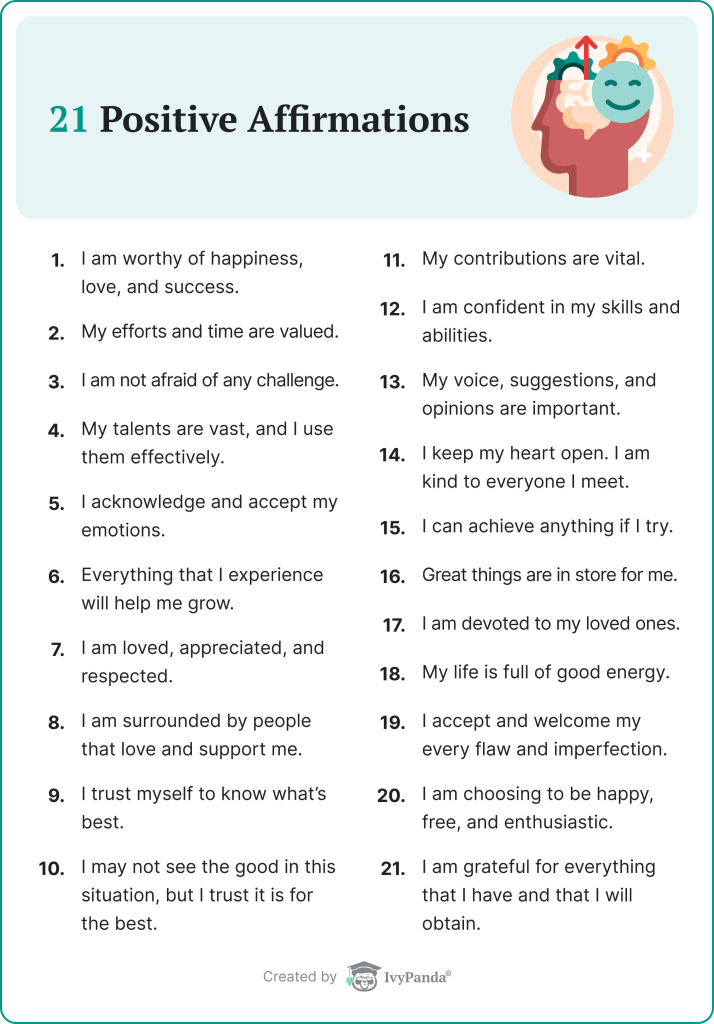
Thank you for reading our article! We hope it will help you become more confident in yourself and your abilities. If you think that our tips can help your friends, send them a link to this page.
🔗 References
- Insecurity – GoodTherapy
- The 3 Most Common Causes of Insecurity and How to Beat Them – Melanie Greenberg, Psychology Today
- 9 Therapist-Approved Tips for Reframing Your Existential Anxiety – Anna Borges, SELF
- 5 Self-Care Practices for Every Area of Your Life – Elizabeth Scott, Verywell Mind
- How to Stop Being Insecure and Build Self-Esteem – Cindy Lamothe, HealthLine
- Stop Being So Hard on Yourself – Melody Wilding, Harvard Business Review
- How to Practice Self-Compassion: 8 Techniques and Tips – Catherine Moore, PositivePsychology.com
- How to Practice Self Compassion and Tame Your Inner Critic – Kerstin Graebner, BetterUp
- Using Affirmations: Harnessing Positive Thinking – MindTools
- Signs of a Toxic Person – WebMD
- How Do I Know if I Need Therapy? – APA, American Psychological Association
- 14 Best Books on Overcoming Insecurity – Carmen Jacob, UpJourney



